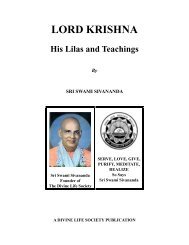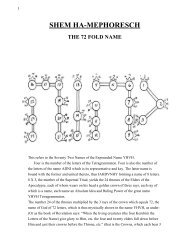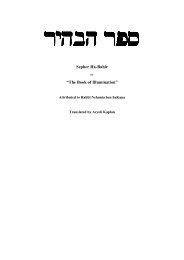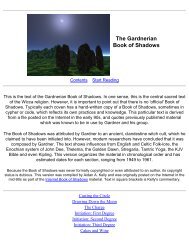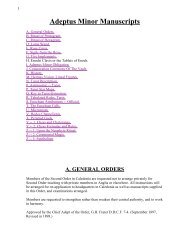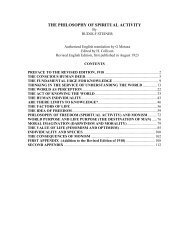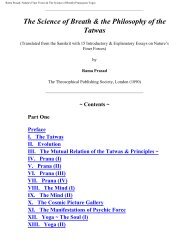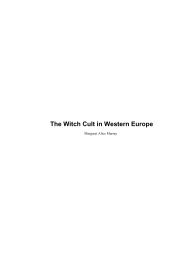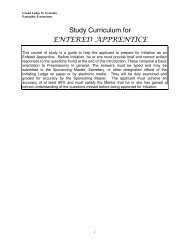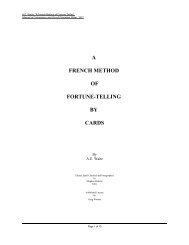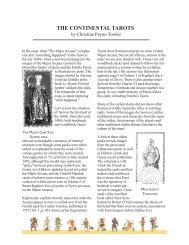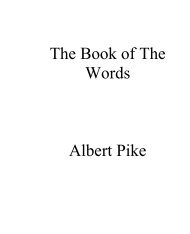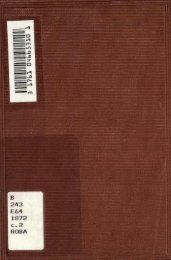Band 2 Anthropogenesis - H.P. Blavatsky
Band 2 Anthropogenesis - H.P. Blavatsky
Band 2 Anthropogenesis - H.P. Blavatsky
You also want an ePaper? Increase the reach of your titles
YUMPU automatically turns print PDFs into web optimized ePapers that Google loves.
Darwinism," p. 159.) Apart from such palpable traces of a primeval hermaphroditism, the fact may be noted that, as Laing<br />
writes, "a study of embryology. . . . shows that in the human higher animal species the distinction of sex is not developed<br />
until a considerable progress has been made in the growth of the embryo." ("A Modern Zoroastrian," p.106.) The Law of<br />
Retardation -- operative alike in the case of human races, animal species, etc., when a higher type has once been<br />
evolved -- still preserves hermaphroditism as the reproductive method of the majority of plants and many lower animals.<br />
------------------------------------------------------------------------<br />
[[Vol. 2, Page]] 173 THE SONS OF KRIYASAKTI.<br />
Kumaras of the Hindu Pantheon and Puranas, those elder sons of Brahma, "Sanandana and the other sons of Vedhas,"<br />
who, previously created by him "without desire or passion, remained chaste, full of holy wisdom and undesirous of<br />
progeny?"*<br />
The power, by which they first created, is just that which has since caused them to be degraded from their high status to<br />
the position of evil spirits, of Satan and his Host, created in their turn by the unclean fancy of exoteric creeds. It was by<br />
Kriyasakti, that mysterious and divine power latent in the will of every man, and which, if not called to life, quickened and<br />
developed by Yogi-training, remains dormant in 999,999 men out of a million, and gets atrophied. This power is explained<br />
in the "Twelve Signs of the Zodiac,"** as follows:--<br />
(b) "Kriyasakti -- the mysterious power of thought which enables it to produce external, perceptible, phenomenal results<br />
by its own inherent energy. The ancients held that any idea will manifest itself externally, if one's attention (and Will) is<br />
deeply concentrated upon it; similarly, an intense volition will be followed by the desired result. A Yogi generally performs<br />
his wonders by means of Itchasakti (Will-power) and Kriyasakti."<br />
The Third Race had thus created the so-called SONS OF WILL AND YOGA, or the "ancestors" (the spiritual forefathers)<br />
of all the subsequent and present Arhats, or Mahatmas, in a truly immaculate way. They were indeed created, not<br />
begotten, as were their brethren of the Fourth Race, who were generated sexually after the separation of sexes, the Fall<br />
of Man. For creation is but the result of will acting on phenomenal matter, the calling forth out of it the primordial divine<br />
Light and eternal Life. They were the "holy seed-grain" of the future Saviours of Humanity.<br />
Here we have to make again a break, in order to explain certain difficult points, of which there are so many. It is almost<br />
impossible to avoid such interruptions. For explanations and a philosophical account of the nature of those beings, which<br />
are now viewed as the "Evil" and rebellious Spirits, the creators by Kriyasakti, the reader is referred to the chapters on<br />
"The Fallen Angels" and "The Mystic Dragons," in Part II. of this Volume.<br />
The order of the evolution of the human Races stands thus in the Fifth Book of the Commentaries, and was already<br />
given:--<br />
The First men were Chhayas (1); the second, the "Sweat-born" (2), the Third, "Egg-born," and the holy Fathers born by<br />
the power of Kriyasakti (3); the Fourth were the children of the Padmapani (Chenresi) (4).<br />
[[Footnote(s)]] -------------------------------------------------<br />
* See "Vishnu Purana," Book I., ch. 7, para. 1.<br />
** See "Five Years of Theosophy," p. 777.<br />
------------------------------------------------------------------------<br />
[[Vol. 2, Page]] 174 THE SECRET DOCTRINE.<br />
Of course such primeval modes of procreation -- by the evolution of one's image, through drops of perspiration, after that<br />
by Yoga, and then by what people will regard as magic (Kriyasakti) -- are doomed beforehand to be regarded as fairytales.<br />
Nevertheless, beginning with the first and ending with the last, there is really nothing miraculous in them, nor<br />
anything which could not be shown natural. This must be proven.<br />
1. Chhaya-birth, or that primeval mode of sexless procreation, the first Race having oozed out, so to say, from the bodies<br />
of the Pitris, is hinted at in a Cosmic allegory in the Puranas.* It is the beautiful allegory and story of Sanjna, the daughter<br />
of Viswakarman -- married to the Sun, who, "unable to endure the fervours of her lord," gave him her chhaya (shadow,<br />
image, or astral body), while she herself repaired to the jungle to perform religious devotions, or Tapas. The Sun,<br />
supposing the "chhaya" to be his wife begat by her children, like Adam with Lilith -- an ethereal shadow also, as in the<br />
legend, though an actual living female monster millions of years ago.<br />
But, perhaps, this instance proves little except the exuberant fancy of the Puranic authors. We have another proof ready.<br />
If the materialised forms, which are sometimes seen oozing out of the bodies of certain mediums could, instead of<br />
vanishing, be fixed and made solid -- the creation of the first Race would become quite comprehensible. This kind of<br />
procreation cannot fail to be suggestive to the student. Neither the mystery nor the impossibility of such a mode is<br />
certainly any greater -- while it is far more comprehensible to the mind of the true metaphysical thinker - than the mystery<br />
of the conception of the foetus, its gestation and birth as a child, as we now know it.<br />
Now to the curious and little understood corroboration in the Puranas about the "Sweat-born."<br />
2. Kandu is a sage and a Yogi, eminent in holy wisdom and pious austerities, which, finally, awaken the jealousy of the<br />
gods, who are represented in the Hindu Scriptures as being in never-ending strife with the ascetics. Indra, the "King of the<br />
Gods,"** finally sends one of his female Apsarasas to tempt the sage. This is no worse than Jehovah sending Sarah,<br />
Abraham's wife, to tempt Pharaoh; but in truth it is those gods (and god), who are ever trying to disturb ascetics and thus<br />
make them lose the fruit of their austerities, who ought to be regarded as "tempting demons," instead of applying the term<br />
to the Rudras, Kumaras, and Asuras, whose great sanctity and chastity seem a standing reproach to the Don Juanic gods<br />
of the Pantheon. But it is



